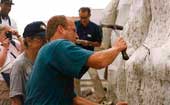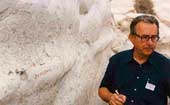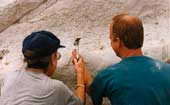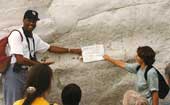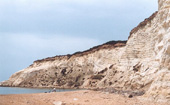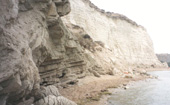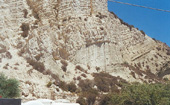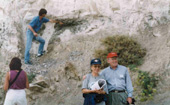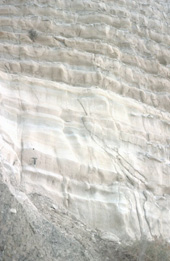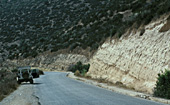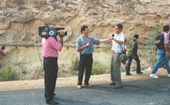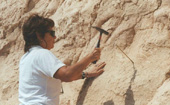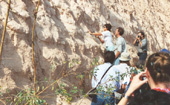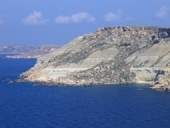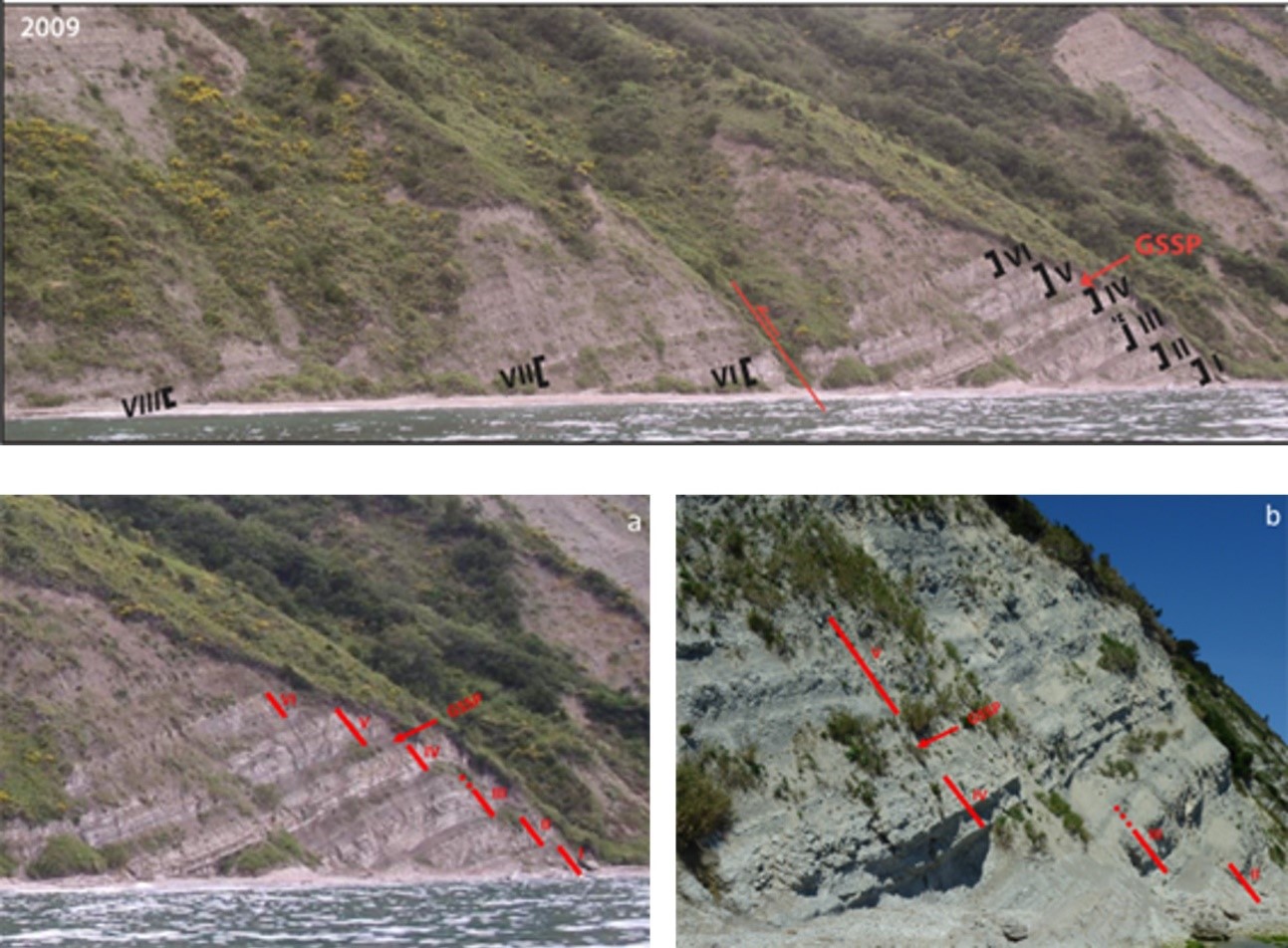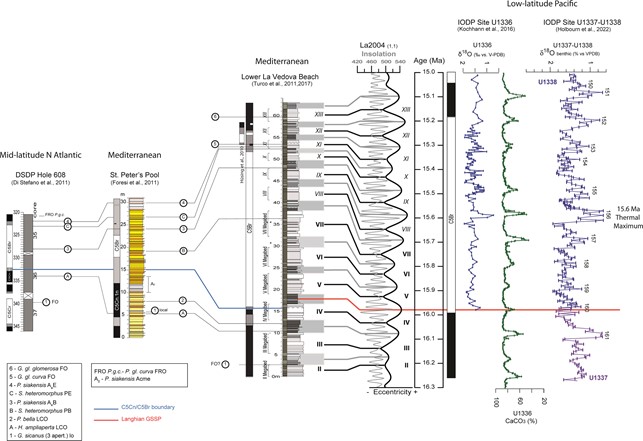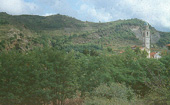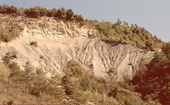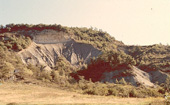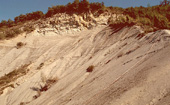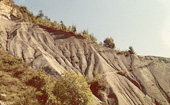GSSPs
Neogene Global Standard Stratotype sections and Points (GSSPs)
Map of GSSPs
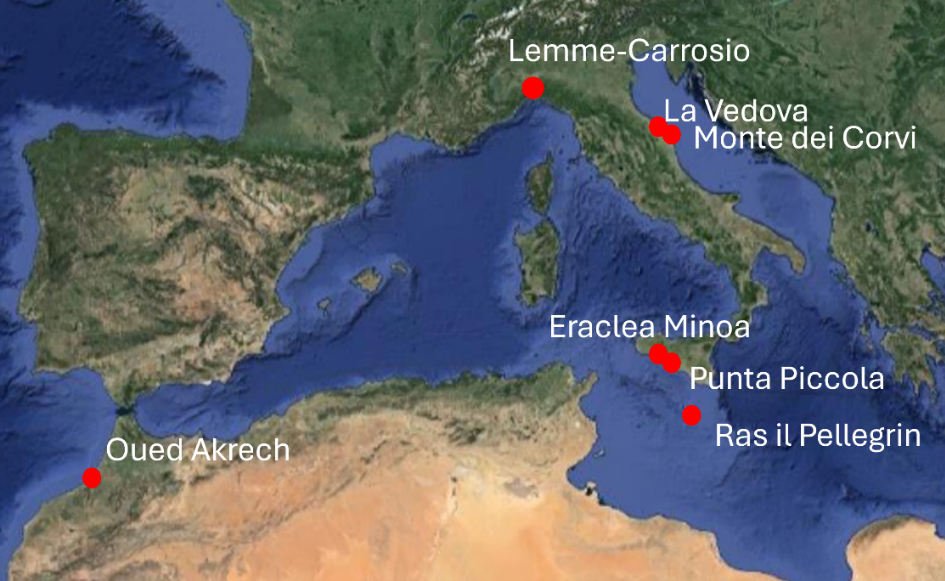
| Stage | Section | Location | |
|---|---|---|---|
| base Piacenzian | Punta Piccola, Sicily, Italy | 37º17’20” N, 13º29’36” E | |
| base Zanclean | Eraclea Minoa, Sicily, Italy | 37º23’30” N, 13º16’50” E | |
| base Messinian | Oued Akrech, Morrocco | 33º56’13” N, 06º48’45” E | |
| base Tortonian | Monte dei Corvi, central Italy | 43º58’67” N, 13º56’94” E | |
| base Serravallian | Ras il Pellegrin, Malta | 35º54’56” N, 14º20’03” E | |
| base Langhian | Lower La Vedova Beach section | central Italy | 43°35’31” N, 13°33’44” E |
| base Neogene | Lemme-Carrosio, northern Italy | 44º39’32” N, 08º50’11” E |
Base of the Piacenzian
The Global Standard Stratotype section and Point (GSSP) of the Piacenzian Stage: Punta Piccola section (Sicily, Italy)
The Piacenzian GSSP is defined at the base of the beige marl bed of small-scale carbonate cycle 77 in the Trubi Fm at Punta Piccola, close to the Gilbert/Gauss reversal boundary. The boundary has been astronomically dated at 3.600 Ma.

Punta Piccola section. Left arrow marks the basal part in which the Piacenzian GSSP is defined and right arrow marks the top of the sapropel that defines the Gelasian GSSP in section Mt San Nicola.
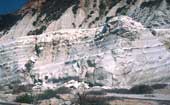
Piacenzian GSSP is marked (in enlarged view) by a solid line. Holes mark sampling trajectory across Gilbert-Gauss boundary.
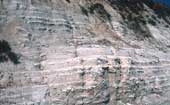
Upward continuation of section Punta Piccola showing the top part of the Trubi Fm.
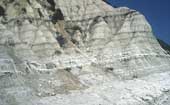
Upper part of the section showing the first sapropels of the overlying Monte Narbone Fm.
Hammering the “golden spike” during the fieldtrip of the Erice conference on Neogene Mediterranean Paleoceanography held in September 1997, featuring Mike Howell, Isabel Zamarreno (with camera), Maria Bianca Cita, Frits Hilgen and Franco Ricci Lucchi (from left to right on the left picture). Mike and Silvia Iaccarino together hold the preliminary boundary plate (right picture).
The Global Standard Stratotype section and Point (GSSP) of the Piacenzian Stage (Middle Pliocene), by D. Castradori, D. Rio, F.J. Hilgen and L.J. Lournes (1998), Episodes 21 (2), pp. 88-93. Full text
Base of the Zanclean
The Global Standard Stratotype section and Point (GSSP) of the Zanclean Stage: Eraclea Minoa section, southern coast Sicily, Italy
The Zanclean GSSP and base of the Pliocene Series is defined at the base of small-scale carbonate cycle 1 of the Trubi marls at Eraclea Minoa. The GSSP predates the base of the Thvera subcron by ~100 kyr and corresponds closely with the C. acutus FO and the T. rugosus LO. The boundary marks the Pliocene flooding following the Messinian salinity crisis in the Mediterranean and is dated astronomically at 5.333 Ma.
Overview of the coastal cliffs at Eraclea Minoa facing W in the direction of Capo Bianco (left) and E towards the camping site (right). Arrows (in enlarged view) mark the Messinian-Zanclean boundary. Note the Messinian gypsym underlying the Trubi marls.
Eastward continuation of the Messinian-Zanclean boundary (arrow in enlarged view) close to the camping site (left). Eric de Kaenel shows the Zanclean GSSP to Conxita Taberner. Bill Ryan and Maria Bianca Cita in front.
Detail of the coastal cliffs at Eraclea Minoa showing the basal part of the Trubi Fm. Arrow (in enlarged view) marks top of cycle 6.
The base of the Zanclean Stage and of the Pliocene Series, by J.A. Van Couvering, D. Castradori, M.B. Cita, F.J. Hilgen and D. Rio (2000), Episodes 23 (3) pp. 179-187. Full text
Base of the Messinian
The Global Standard Stratotype section and Point (GSSP) of the Messinian Stage: Oued Akrech section, Morocco
The Messinian GSSP is defined at the base of reddish layer of small-scale carbonate cycle OA-15. It falls within the reversed interval of subchron C3Br.1r and closely coincides with the FRO of the G. conomiozea group. The boundary has been astronomically dated at 7.251 Ma.
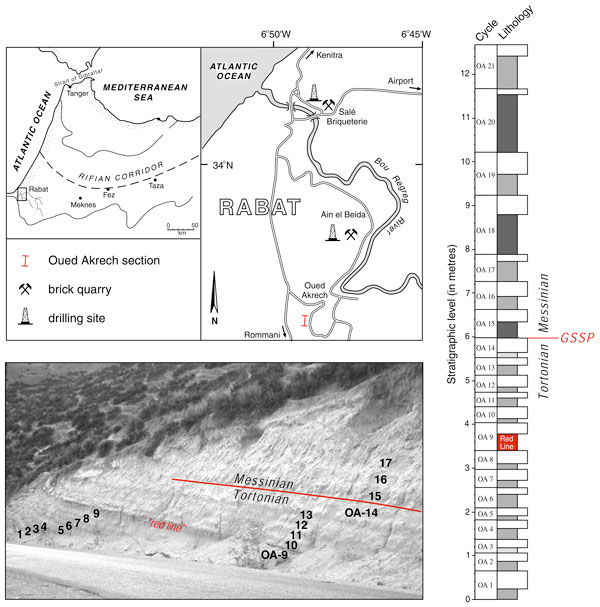
Messinian GSSP in section Oued Akrech, Atlantic side of Morocco. Preparation (top middle) and nailing down (bottom) of the “golden spike” with Silvia Iaccarino and Wout Krijgsman during one of the fieldtrips of the RCMNS congres held in Rabat, September 2000. Interview for Moroccan television in top right.
The Global Boundary Stratotype Section and Point (GSSP) of the Messinian Stage (uppermost Miocene), by F.J. Hilgen, S. Iaccarino, W. Krijgsman, G. Villa, C.G. Langereis and W.J. Zachariasse (2000), Episodes 23 (3) pp. 172-178. Full text
Base of the Tortonian
The Global Standard Stratotype section and Point (GSSP) of the Tortonian Stage: Monte dei Corvi section, northern Italy
The Tortonian GSSP is defined at the mid-point of the sapropel of cycle 76 in the Monte dei Corvi section (northern Italy). It is close to the LCOs of Discoaster kugleri and Globigerinoides subquadratus and associated with the short normal subchron C5r.2n. The GSSP level coincides closely with oxygen isotope event Mi-5.
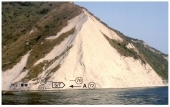
The Serravallian/Tortonian boundary interval in the Monte dei Corvi section (basic sedimentary cycles between 72 and 89). The S/T boundary is defined at mid-point of the sapropel of cycle 76.
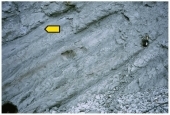
The yellow arrow marks the Tortonian GSSP and the (empty) bottle the Ancona ash bed.
The Global boundary Stratotype Section and Point (GSSP) of the Tortonian Stage (Upper Miocene) at Monte dei Corvi, by Hilgen F.J., Abdul Aziz H., Bice D., Iaccarino S., Krijgsman W., Kuiper K., Montanari S., Raffi I., Turco E. and Zachariasse W.J. (2005), Episodes. 28, pp. 6-17. Full text
Base of the Serravallian
The Global Standard Stratotype section and Point (GSSP) of the Serravallian Stage: Ras il Pellegrin section, Malta
The Serravallian GSSP is defined at the formation boundary (i.e. at top of “transitional Bed”) between the Globigerina Limestone and Blue Clay Formation in the Ras il Pellegrin section (Malta). It coincides with the termination of the Mid-Miocene climate transition marked by the end of Mi-3b oxygen isotope shift. The Serravallian GSSP slightly precedes the S. heteromorphus L(C)O previously considered as guiding criterion for the Langhian-Serravallian boundary.
The Global boundary Stratotype section and Point (GSSP) of the Serravallian Stage (Middle Miocene), by Hilgen F.J., Abels H.A, Iaccarino S., Krijgsman W., Raffi I., Sprovieri R., Turco E., and Zachariasse J.W.,(2009), Episodes, 32, pp. 152-166. Full text.
Base of the Langhian
The Global Standard Stratotype section and Point (GSSP) of the Langhian Stage and the Middle Miocene Subseries: Lower La Vedova Beach section, central Italy.
The Langhian GSSP is defined as level 17.84 m from the base of the section, in the middle of the dark coloured marly interval overlying Megabed IV. This stratigraphic level is astronomically calibrated to the most prominent ~100-kyr eccentricity maximum around 16 Ma and lies close to the Chron C5Cn/C5Br magnetic reversal boundary which is considered the principal event for recognizing the boundary globally.
In addition, Integrated Ocean Drilling Program (IODP) Site U1337 in the eastern equatorial Pacific was designated as Standard Auxiliary Boundary Stratotype (SABS) with the objective of directly linking the Langhian GSSP to the astronomically calibrated open ocean benthic foraminiferal stable isotope record. The SABS shows that the GSSP for the base of Langhian Stage and Middle Miocene Subseries at around 16 Ma falls within the Miocene Climate Optimum (MCO) and is ~400-kyr older than the most prominent eccentricity paced hyperthermal event, astronomically dated at 15.6 Ma.
The Global Stratotype Section and Point (GSSP) of the Langhian Stage and of the Middle Miocene Subseries, by Turco E., Hilgen F., Raffi I., Di Stefano A., Foresi L.M., Holbourn A., Iaccarino S.M., and Lirer F. (2023), Published online November 1, 2023. Full text
Base of the Neogene
The Global Standard Stratotype section and Point (GSSP) of the base of the Neogene: Lemme-Carrosio section, Alessandria Province, northern Italy
The GSSP of the base of the Neogene is defined at 35 meter from the top of the Lemme-Carrosio section in the village of Carrosio, south of the town of Gavi and north of Voltaggio (Alessandria Province), northern Italy. It defines both the Paleogene-Neogene Period-System boundary, as well as the Oligocene-Miocene Epoch-Series boundary. It coincides with the base of geomagnetic subchron C6Cn.2n and falls near the base of calcareous nannoplancton Zone NN1.
The Lemme-Carrosio section, GSSP of the base of the Neogene
The Global Stratotype Section and Point (GSSP) for the base of the Neogene, by F.F. Steininger and others (1997), Episodes 20 (10), pp. 23-28. Full text

